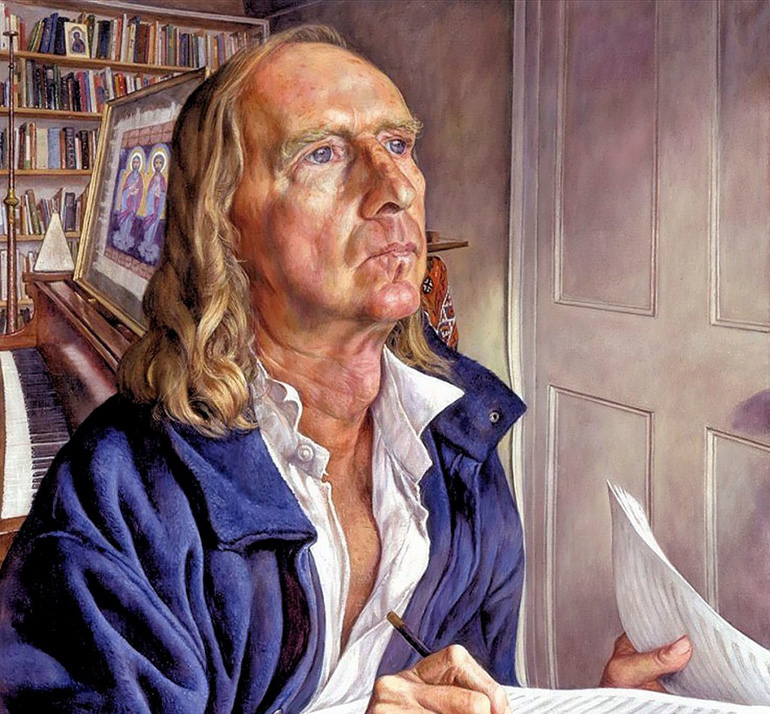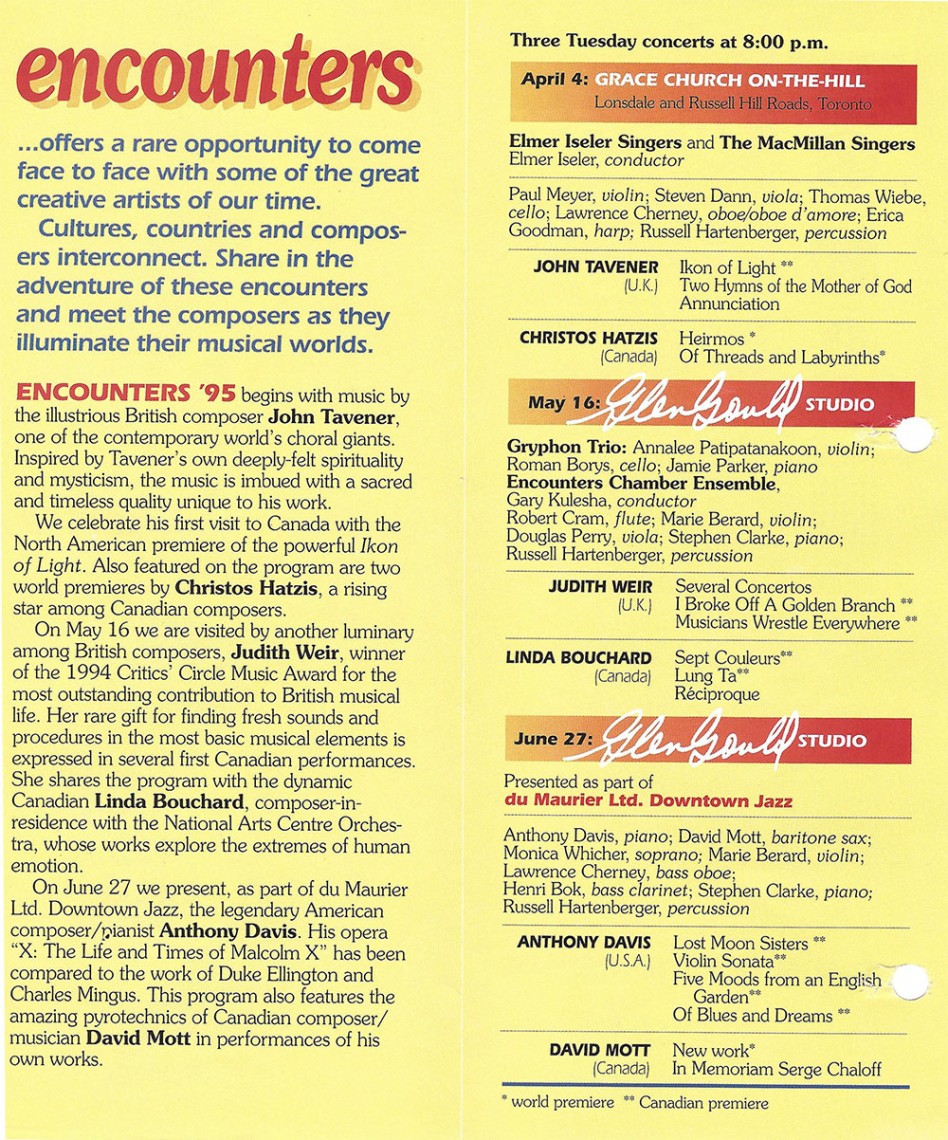
A special guest post by Soundstreams Artistic Director Lawrence Cherney, on his personal memories of composer and friend Sir John Tavener.
Toronto – I first met Sir John Tavener and his wife Maryanna when they visited Toronto in 1995 at our invitation to attend the Canadian premiere of his Ikon of Light. This premiere took place at Grace Church on-the-Hill in a concert that paired him and his music with that of Canadian Christos Hatzis. Both composers take a deep inspiration from Greek Orthodox spirituality, and really did hit it off. Connected by yet another impulse, both were searching deeply at the time for spiritual awakening, and I remember being struck by how their works were both powered by dissonance. Now, 20 years after that first visit, we will celebrate and remember John’s life and work in Soundstreams’ concert Song for Athene at Trinity St. Paul’s Centre on April 16.
The concert at Grace Church on-the-Hill was part of our Encounters series, which we co-produced with CBC Radio 2’s weekly network program Two New Hours. Our partner in crime for this series was Executive Producer David Jaeger, who was both knowledgeable and astute in his assessments of composers. The goal of the series was to pair an international composer with a Canadian counterpart, and to search for visiting composers who were either “undiscovered,” or even if better known, were under-exposed in Canada. All of the British composers featured in those early years – Gavin Bryars, Judith Weir, Tomas Adès, James MacMilllan, and John Tavener, of course – have had huge careers.
So it’s perhaps not surprising that we invited John, but it’s only now that I realize how extraordinary it was that he actually got to Toronto at all, let alone twice. John lived most of his life with serious illness, afflicted with a serious heart condition as a result of being extremely tall and thin. He was almost literally always under the shadow of death, so it is not surprising that so much of his music dealt with this theme. He could only travel on airplanes with the approval of his physician; but on the other hand, his wife Maryanna had family around Toronto, a special incentive to make that first trip.
For that April 1995 concert, pre-sales had been slow — we had concerns that we had brought him all the way from England to have his works performed for a small house. To our great delight, several hundred people showed up at the door, a clear indication that even then, the word was getting out about Tavener’s music.
I interviewed John from the stage that night as a last-minute stand-in for the regular host of Two New Hours who had become ill. By that time, we had already had a number of casual conversations, including at least one about his love of flashy British sports cars. But even then, he could still be an enormously intimidating figure. He was unusually tall and strikingly charismatic, with long flowing hair and an other-worldly gaze. In different garb, he could easily have been an ascetic monk holed up writing religious music in a mediaeval monastery.
But there was an entirely other side to John: vigorous, energetic, and highly opinionated, possessing a larger-than-life and hugely attractive personality. He wanted to become famous and he did so, featured on the covers of magazines as a symbol of fashion in the 1970’s, and as a radio and television personality. A connection through his family with The Beatles led to his early work, The Whale, being recorded and released on their Apple label and his fame was assured as a result. And, of course, after Song for Athene was performed at Princess Diana’s funeral in Westminster Abbey in 1997, the whole world knew who he was. Interviewing John from the stage could have been quite daunting, but on the contrary, it was like being invited into his living room to be told a story. His works were mostly based on spiritual myths and legends, and he was a masterful storyteller. He told the story behind each work in such a way that we suffered the depths of despair along with the characters, just as we felt enormous joy in their triumphs.
John returned in 2002 for our second production of his music, this time at St. Michael’s Cathedral. This was one of the rare occasions when permission was given to present a concert in the Cathedral, and the concert was sold-out long before it started, causing disappointment to the nearly 200 people lined up down the block who couldn’t get in. For this concert, John was in the company of the Bombay-born soprano Patricia Rozario, whom he had met in 1991, and who had subsequently become his muse. She came to Toronto a second time for Soundstreams in 2007. Patricia has the most unearthly, ethereal high register—none of us will ever forget the way she sang Eternity’s Sunrise in 2002—it really is a voice that could only have come from heaven.

On John’s second visit to Toronto, he was hosted by Peggy Monastra, now Head of Promotions at Schirmer Music in New York, who had flown in for the occasion. Several times during the visit, Peggy had other meetings and asked me if I would make sure he had everything he needed. On one occasion, I remember John telling me he needed a toothbrush, so we walked to a drug store. We chatted about children, him having two by then with a third on the way. We were in the drugstore for a good 20 minutes when I realized that, at least in this lifetime, John might never get around to finding a toothbrush, let alone paying for it in Canadian dollars! It’s not that he was helpless—of course, he wasn’t—but his gaze was forever up, not down where the toothbrushes were.
Following John’s visit in 2002, the enlightened philanthropists Michael and Sonja Koerner became interested in commissioning a new work from him for Soundstreams’ Northern Voices International Choral Festival in 2005. The result was Invocations and Last Word, premiered by conductor Tõnu Kaljuste from the middle of Metropolitan United Church with four choirs, each positioned in one of the four corners. Such spatial deployment can be a minefield in performance because of the challenges in each hearing the other choirs, but when it succeeds, as it did on this occasion, the result is a stunning surround sound experience for the audience that is unparalleled in the concert hall. Unfortunately, John’s health prevented a third visit to Toronto for this occasion.
There was one further wonderful ripple caused by his two Toronto visits. In 2002, we had taken John to see the monumental Barbara Frum Atrium at CBC, and it was clear that he had a vision for a new work on the spot. The numerous portals overlooking the Atrium from the balconies were an important source of inspiration for his 2007 work The Beautiful Names, a meditation on the 99 names of Allah, commissioned by Prince Charles.
In 2013, the music world lost two luminaries: British composers John Tavener and Jonathan Harvey. They could not have been more opposite as personalities and in their compositional aesthetic, yet both grappled with the universal human yearning to reconcile man with the divine. In that struggle for reconciliation, they have much in common with one of our other featured composers on the April 16 concert, Christos Hatzis.
Soundstreams and I have had close relationships with all three through commissions, performances, and personal appearances throughout the years. Whatever beliefs each may have held, their spiritual journeys encompassed, in addition to Christianity, explorations of Hinduism, Sanskrit writings, Buddhism, Greek Orthodoxy, Judaism, Islam, North American Aboriginal cultures and more. How fitting, then, that Patricia Rozario has chosen to sing a work based on Sanskrit poetry by our other featured composer, the Indian Vanraj Bhatia.
I was invited to attend a celebration of the life and music of John Tavener last June in Westminster Abbey. Barbican Centre Managing Director, and former Director of the BBC Proms, Nicolas Kenyon’s poignant remarks about the late composer have real resonance for all the music to be heard April 16:
“In his later years, [Tavener] became ever more interested in Hinduism, and metaphysical writings. Did this mean that he rejected his previous ways of interacting with the divine? Surely the opposite. He simply came to feel that denominational religions were just part of a far greater universal hope, that they pointed the way to the ultimate reconciliation of man with the divine.”
Ultimately, John’s music resonates because we all relate to the struggle to find meaning in our lives beyond the here and now. He spent his whole life searching for that meaning, and like many of us, was never sure that he had found it, touching us with a profound spiritual restlessness. On April 16, we will get close to the man through reminiscences of those who knew him, and through hearing his voice both in speech and in the music that has moved us so deeply.



